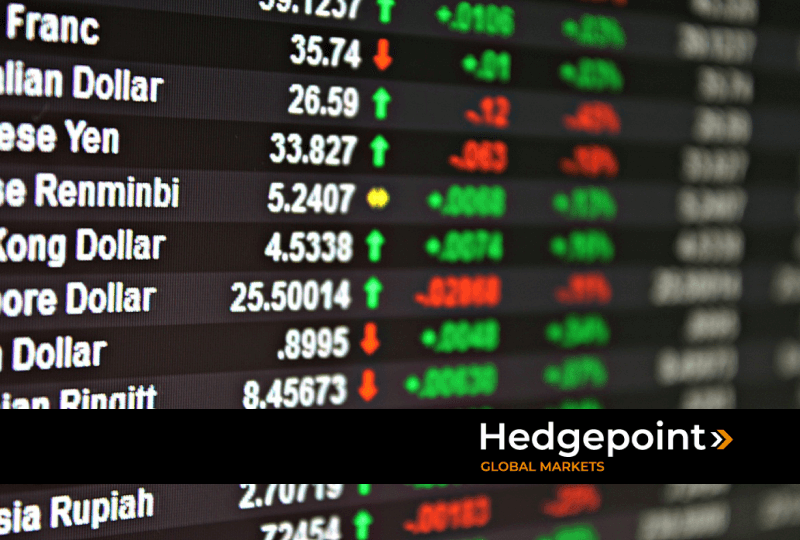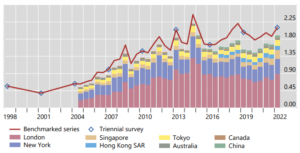
The foreign exchange market, also known as FOREX (foreign exchange), is a global system for trading foreign currencies. Its network of financial centers is

The foreign exchange market, also known as FOREX (foreign exchange), is a global system for trading foreign currencies. Its network of financial centers is open 24 hours a day and closes only on weekends.
In practice, the foreign exchange market uses national currencies, such as the Brazilian real or the US dollar, to convert the value of international transactions. For example, when importing and exporting assets, products are traded in different currencies and the exchange system prices the exchange value between each of them.
In this article, we’ll understand how this market works, its most common operations, and the role of foreign exchange in the global economy. Read on!
How do currencies work in the Forex market?
To understand the foreign exchange market, you also need to know how quotes work. In the world, foreign currencies have specific values in relation to each other. This means that each one has a different purchasing power, depending on the economic fundamentals of its country. Interest rates, inflation, political events and supply and demand are some of the factors that determine the price of a currency.
To quote a currency in the market, you must always compare its value to another currency. For example, an American farmer who needs to receive dollars may need to understand how much he should charge a Brazilian importer who has reais. In this case, the exchange rate determines how many units of reais will be paid for one unit of dollars.
On July 16, 2024, the Central Bank of Brazil (BCB) published that the value of this transaction, according to the PTAX rate, would be 5.4268 reais at the buying rate for each dollar, and 5.4274 reais at the selling rate. The difference in price between one currency and another is known as the exchange rate.
Read also:
The above example shows a floating exchange rate, which changes according to the supply and demand of the currency, inflation, interest rates, as well as the economic fundamentals of the country. However, in each country’s economic policy, each central bank can adopt other exchange rate regimes such as: fixed, controlled and multiple.
The first is controlled by the central bank, which sets a fixed value for a currency to maintain its economic stability. The second allows a currency to fluctuate in value within a certain range. The limits of this range are also controlled by the central bank. Finally, multiple rates are used in commercial transactions to facilitate the monitoring of funds.
Understand what exchange rate policy is
In a market with fluctuating prices, there are government or banking instruments that seek to control the value of a country’s currency in relation to foreign currencies. These measures are taken to stabilize the domestic economy, since the devaluation of its currency can cause commercial losses, as well as social and economic repercussions.
Exchange rate policy affects the inflation of a nation’s currency, as well as import and export prices. More than that, it also changes the national economy, its competitiveness in the market and its financial stability. Generally, exchange rate policy is applied through the control of capital flows, tax breaks, monetary measures and more.
Read also:
Foreign exchange market: the main players and the most common operations
The foreign exchange market is influenced by various institutions and entities. Central banks and commercial banks are the most important, as they can influence exchange rates, create monetary policies or intervene directly. On the website of the BCB, you can also see the banks that are authorized to operate in the foreign exchange market.
In addition to them, there are other players who play a fundamental role in the foreign exchange system. Let’s look at them all and understand what their most common operations are. These players are part of two structures in the Forex market. The primary one refers to transactions made by tourists, importers and exporters. The secondary market refers to transactions between banks.
See below:
Foreign Exchange Brokers
International banks
Importers and exporters
Hedging firms
Investors
Levels of the Foreign Exchange Market
The participants mentioned above operate at different levels of the Forex market. Understand each of them:
Spot Market
Forward Market
Derivatives market
Market movement data
Now that you understand the structure of the foreign exchange system, let’s take a look at how this market moves around the world. According to the Bank for International Settlements (BIS), the main financial centers operating in this sector are
According to the institution, trading activity in the foreign exchange market tends to peak when trading hours in London and New York overlap. This occurs in the late afternoon in New York and in the early morning in Asia. During its operation, the financial centers trade more than 50 currencies, and the U.S. dollar is considered the vehicle currency. The USD accounts for nearly 90% of all global foreign exchange transactions, with the euro (EUR) and the Japanese yen (JPY) a distant second and third.
According to the central bank’s latest Triennial Survey of Foreign Exchange and Derivatives Market Activity, the average daily trading volume in the spot market has been increasing for many years. See the table below, calculated in trillions of US dollars:

Source: BIS
The data show that trading on the spot market is concentrated in large financial centers such as London, which accounted for 38% of transactions in 2022. The new Triennial is due to be published 3 years after the last one, but the influence of these major players is still expected in the next studies.
What is the role of hedging in this context?
As we’ve seen in this article, currency prices continue to fluctuate. Various factors are responsible for this fluctuation and it is an inherent characteristic of this market.
It is essential for traders to protect themselves from price volatility by using hedging tools to manage risk. Hedgepoint offers hedging instruments combined with data analysis and insight for all those involved in this market.
Contact us to find out how we can help your business!

Rua Funchal, 418, 18º andar - Vila Olímpia São Paulo, SP, Brasil
Contato
(00) 99999-8888 example@mail.com
Section
Home
O que Fazemos
Mercado
Quem Somos
HUB
Blog
Esta página foi preparada pela Hedgepoint Schweiz AG e suas afiliadas (“Hedgepoint”) exclusivamente para fins informativos e instrutivos, sem o objetivo de estabelecer obrigações ou compromissos com terceiros, nem de promover uma oferta ou solicitação de oferta de venda ou compra de quaisquer valores mobiliários, commodity interests ou produtos de investimento.
A Hedgepoint e suas associadas renunciam expressamente a qualquer uso das informações contidas neste documento que direta ou indiretamente resulte em danos ou prejuízos de qualquer natureza. As informações são obtidas de fontes que acreditamos serem confiáveis, mas não garantimos a atualidade ou precisão dessas informações.
O trading de commodity interests, como futuros, opções e swaps, envolve um risco substancial de perda e pode não ser adequado para todos os investidores. Você deve considerar cuidadosamente se esse tipo de negociação é adequado para você, levando em conta sua situação financeira. O desempenho passado não é necessariamente indicativo de resultados futuros. Os clientes devem confiar em seu próprio julgamento independente e/ou consultores antes de realizar qualquer transação.
A Hedgepoint não fornece consultoria jurídica, tributária ou contábil, sendo de sua responsabilidade buscar essas orientações separadamente.
A Hedgepoint Schweiz AG está organizada, constituída e existente sob as leis da Suíça, é afiliada à ARIF, a Associação Romande des Intermédiaires Financiers, que é uma Organização de Autorregulação autorizada pela FINMA. A Hedgepoint Commodities LLC está organizada, constituída e existente sob as leis dos Estados Unidos, sendo autorizada e regulada pela Commodity Futures Trading Commission (CFTC) e é membro da National Futures Association (NFA), atuando como Introducing Broker e Commodity Trading Advisor. A Hedgepoint Global Markets Limited é regulada pela Dubai Financial Services Authority. O conteúdo é direcionado a Clientes Profissionais e não a Clientes de Varejo. A Hedgepoint Global Markets PTE. Ltd está organizada, constituída e existente sob as leis de Singapura, isenta de obter uma licença de serviços financeiros conforme o Segundo Anexo do Securities and Futures (Licensing and Conduct of Business) Act, pela Monetary Authority of Singapore (MAS). A Hedgepoint Global Markets DTVM Ltda. é autorizada e regulada no Brasil pelo Banco Central do Brasil (BCB) e pela Comissão de Valores Mobiliários (CVM). A Hedgepoint Serviços Ltda. está organizada, constituída e existente sob as leis do Brasil. A Hedgepoint Global Markets S.A. está organizada, constituída e existente sob as leis do Uruguai.
Em caso de dúvidas não resolvidas no primeiro contato com o atendimento ao cliente (client.services@hedgepointglobal.com), entre em contato com o canal de ouvidoria interna (ombudsman@hedgepointglobal.com – global ou ouvidoria@hedgepointglobal.com – apenas Brasil) ou ligue para 0800-8788408 (apenas Brasil).
Integridade, ética e transparência são valores que guiam nossa cultura. Para fortalecer ainda mais nossas práticas, a Hedgepoint possui um canal de denúncias para colaboradores e terceiros via e-mail ethicline@hedgepointglobal.com ou pelo formulário Ethic Line – Hedgepoint Global Markets.
Nota de segurança: Todos os contatos com clientes e parceiros são realizados exclusivamente por meio do nosso domínio @hedgepointglobal.com. Não aceite informações, boletos, extratos ou solicitações de outros domínios e preste atenção especial a variações em letras ou grafias, pois podem indicar uma situação fraudulenta.
“Hedgepoint” e o logotipo “Hedgepoint” são marcas de uso exclusivo da Hedgepoint e/ou de suas afiliadas. O uso ou reprodução é proibido, a menos que expressamente autorizado pela HedgePoint.
Além disso, o uso de outras marcas neste documento foi autorizado apenas para fins de identificação. Isso, portanto, não implica quaisquer direitos da HedgePoint sobre essas marcas ou implica endosso, associação ou aprovação pelos proprietários dessas marcas com a Hedgepoint ou suas afiliadas.
aA Hedgepoint Global Markets é correspondente cambial do Ebury Banco de Câmbio, de acordo com a resolução CMN Nº 4.935, DE 29 DE JULHO DE 2021, Artigo 14 do Banco Central do Brasil (BACEN).
Para mais informações sobre nosso parceiro, serviços disponíveis, atendimento e ouvidoria, acesse o link a seguir: https://br.ebury.com/